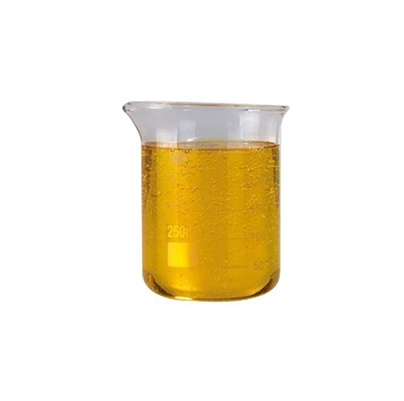Cardanol Resin

Cardanol based resins offers an outstanding resistance to softening action of mineral oils and high resistance to acids & alkalis, antimicrobial property and insect resistance.
Novolac and Resol Resins : Cardanol is very suitable for manufacturing both Novolac and Resol resins.
When used with acid catalyst and with Cardanol to formaldehyde mole ratio in the range of 1:0.6 to 1:0.8 , Novolac resins are yielded.
When used with alkaline catalyst and with Cardanol to formaldehyde mole ratio in the range of 1:1.25 to 1:1.50 , Resol resins are yielded.
Oil and Alcohol soluble resins : Normally the resins based on Cardanol are oil soluble. It is however, possible to manufacture alcohol soluble resins also if the reaction is arrested at the proper stage. Resins based on Cardanol and phenol in the ratios of 1:3 are also alcohol soluble
Application
Paints /Enamel Paints/Primers/Coatings
- The Cardanol based resins have good compatibility with other synthetic resins such as alkyds, epoxies chlorinated rubber, phenolic etc., and can serve as raw material for variety of paints.
- Epoxy–cardanol resins developed using epichlorohydrin, bisphenol-A and cardanol, exhibits better properties as compared to epoxy resin in terms of increase in tensile strength, elongation, bond with steel and lowering of water vapor transmission of the film. The improvement in these properties indicated that the paints based on modified resin would be more durable than the epoxy based paints.
- The anticorrosive properties of epoxy–cardanol resin based paints are superior to that of the paints formulated with the unmodified epoxy resin. Micaceous iron oxide based paints in epoxy–cardanol resin showed the best performance followed by zinc phosphate based paints.
- The Cardanol based resins are used to achieve required gloss, flexibility as well as good mechanical strength, quick drying ability, rust and corrosion inhibiting property, excellent resistance to water, acid, alkali and other chemicals and many such properties for Anti-Corrosive Properties
- Used in substitution of alkyds in enamels
- Mannich reaction of cardanol, formaldehyde, and certain amines is called a phenalkamine sharing the common characteristic of Mannich base curing agents like extremely fast cure, low temperature cure (even below 0°C), good chemical resistance, good surface appearance, good moisture tolerance, and non-blushing properties. In addition, phenalkamines also have very good pot life, good flexibility, surface tolerance, and excellent water and salt water resistance, being an excellent material for marine paints
Ink printing
- An excellent offset ink formulators for the liquid that holds the particles of pigment and carries them to the paper.
- Petroleum oil -free formulation
- 100% Solid with Fast Setting Properties
- Enhance the color, stability, gloss and drying properties
- Eco-Friendly Product
Laminating Industry
- Resole type cardanol formaldehyde resin solution in alcohol is used as powerful adhesives for laminates and metal to metal bonding
Epoxy resins
- Provides extremely good insulating properties
Rubber articles
- Cardanol Resins based on the reaction products of cardanol phenol and formaldehyde are used to improve the resistance of rubber articles to ozone cracking
Putty and electrical
- Polyurethane resins of cardanol are used in sealants encapsulating puttys
Pesticides
- Cardanol Formaldehyde resin is used as a solvent for well known pesticides such as Pyrethrin and Rotanes. Paranitro Tetrahydro Cardanol finds use as a coupling compound in sprayable pesticides such as Parathion.
Protective Coatings for Heavy Duty and Marine Applications
- An excellent Anti-corrosive Paints based on Epoxy Resins cured by Phenalkamines
Adhesives
- Adhesives based on Cardanol Resins give superior water resistance and bonding properties to the plywood
- Many types of adhesives and cements can be prepared with Cardanol. When it reacts with Epichlorohydrin and is modified with Phthalic Anhydride, a coating compound is obtained, which has excellent film properties and adhesion.
Friction Particles
- Friction particles are made by polymerizing the unsaturated side chain of cardanol, followed by cross-polymerization with phenol to yield a cardanol-formaldehyde resin by a process analogous to the formation of phenol-formaldehyde resins such as Bakelite
Mineral Oils
- Cardanol based resins posses an outstanding resistance to softening action of mineral oils and high resistance to acids & alkalis, antimicrobial property, termite and insect resistance etc
Rubber Compounds
- Cardanol resins are used in Rubber Compounding to add such properties as high tear strength and resistance against Petroleum based solvents
Insulating Varnishes
- Cardanol resin varnishes in addition to water and chemical resistance have good air drying and baking properties. These compositions are suitable for wood finishes, food can lacquers taxtile bobins and high quality paints. Stoving paints can be prepared which could be baked at 60°C
- Cardanol resin varnishes have good electrical insulating properties and resistance against water and chemicals. They give superior quality Stamping Varnishes. Because of their high insulation and dielectric losses, cardanol based varnishes outperform the vanishes with the composition based on commonly used cresol and other phenol substitutes